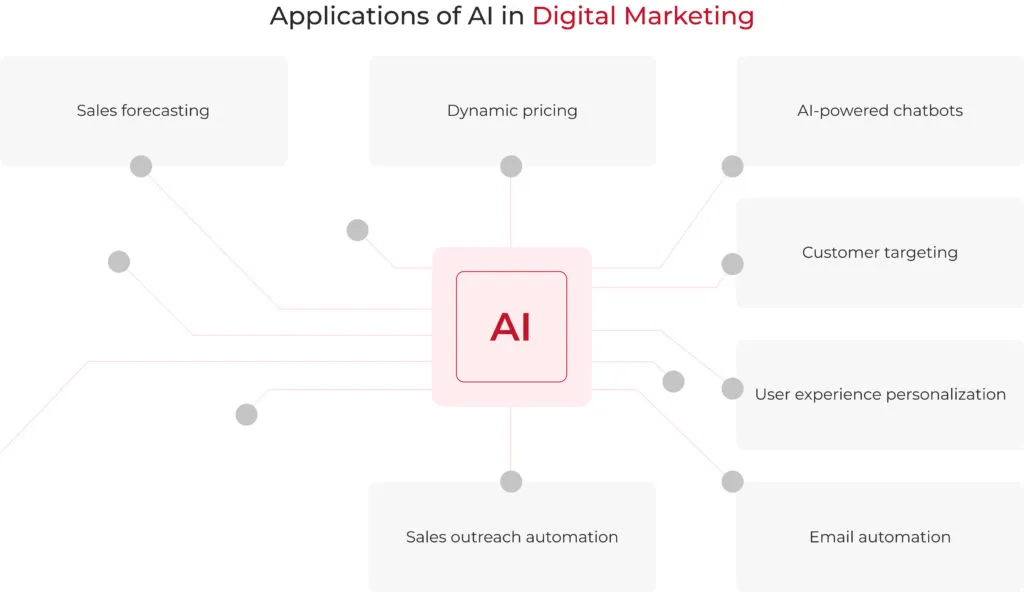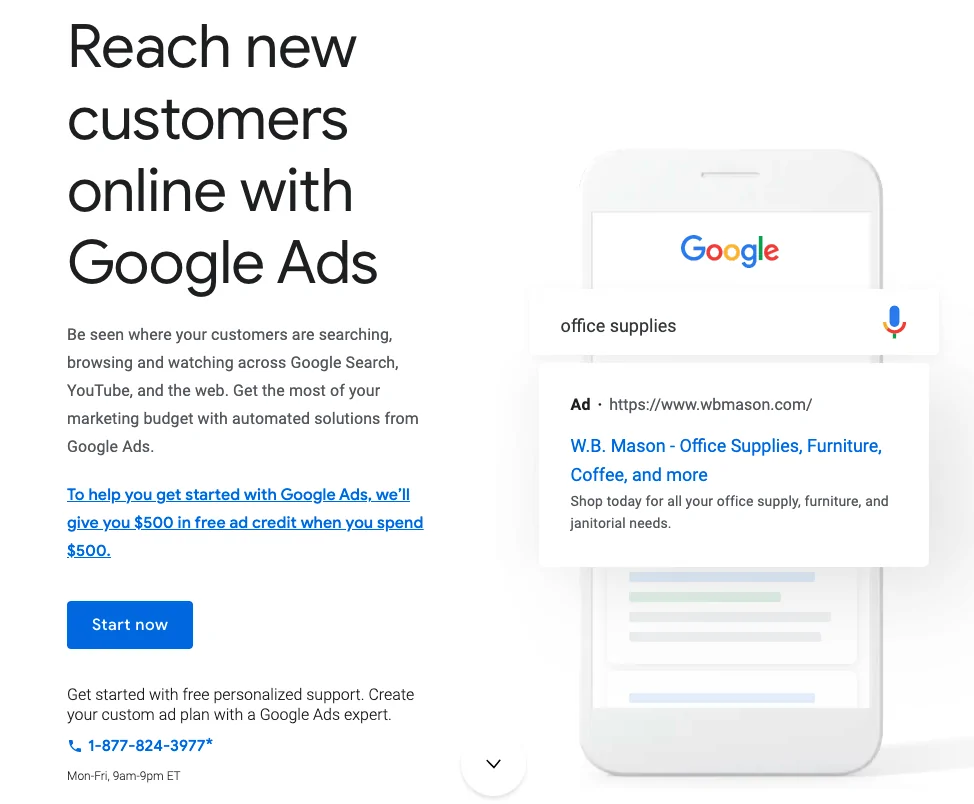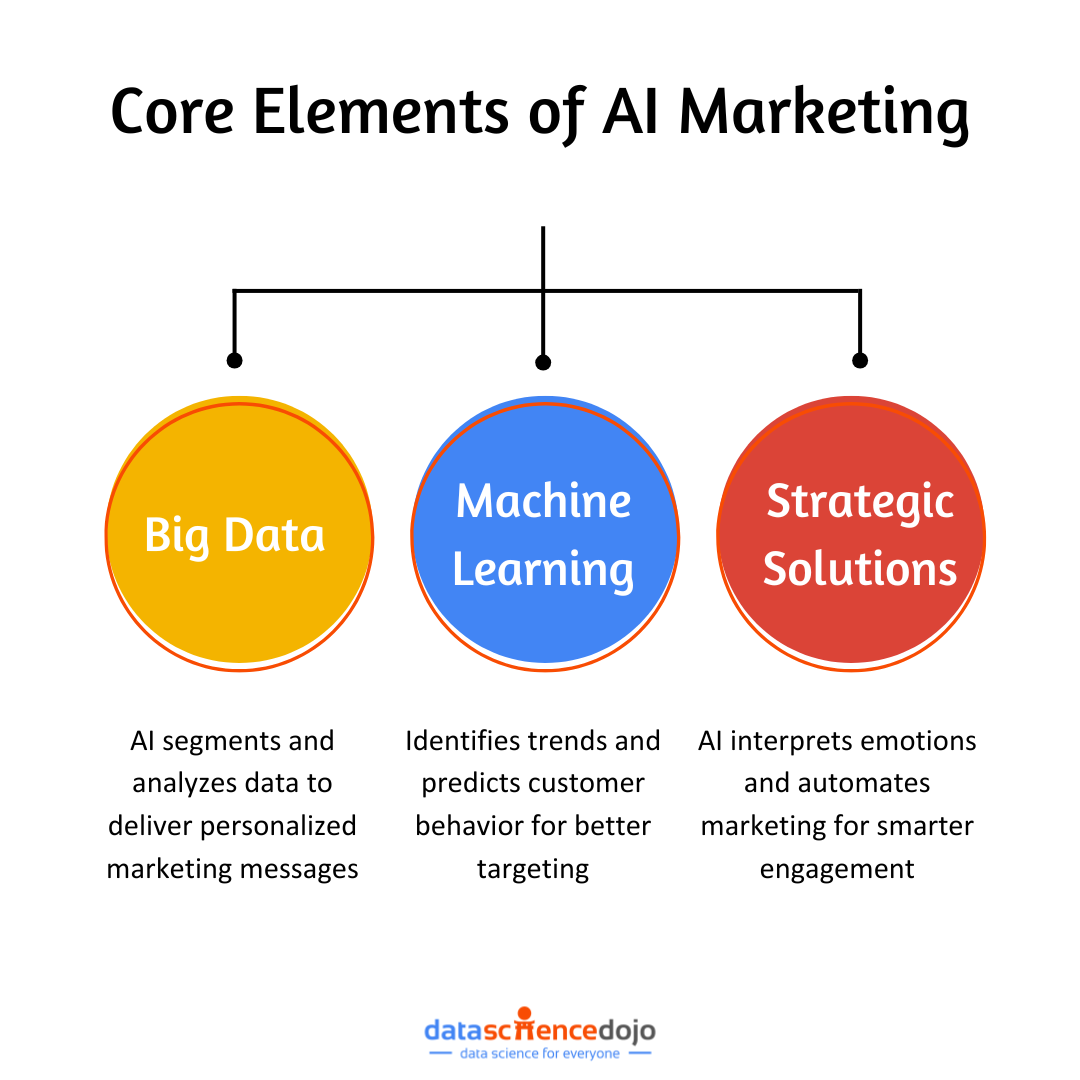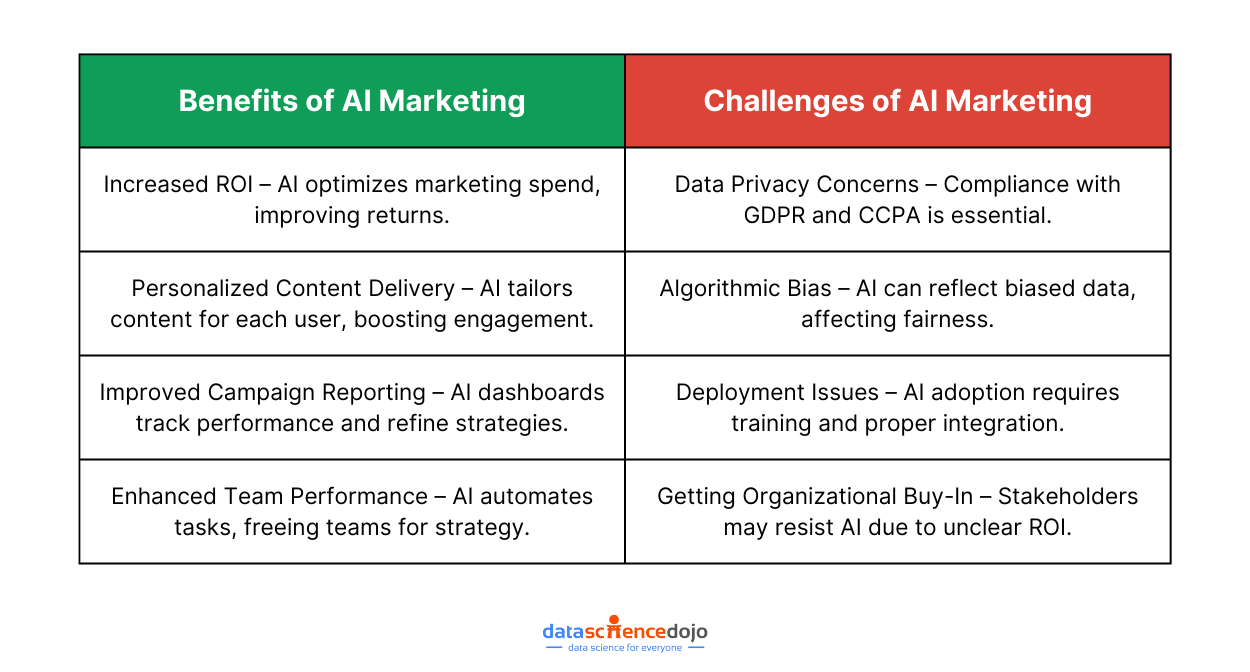AI is no longer just a futuristic concept – it’s revolutionizing industries today, and marketing is no exception. With AI marketing, brands can analyze vast amounts of data, automate repetitive tasks, and deliver hyper-personalized experiences at scale.
According to a report by McKinsey & Company, AI-powered personalization can boost marketing revenue by up to 15% while reducing acquisition costs by 50%. That’s the power of AI marketing, and it’s reshaping the way businesses connect with their customers.
But how does it work, and more importantly, how can you use it to your advantage?
This guide will delve into the core elements of AI marketing, its biggest benefits, real-world use cases, and even the challenges that come with it. Let’s dive into the world of AI marketing and uncover how it’s shaping the future of digital engagement.
What is AI Marketing?
AI marketing is the game-changer modern businesses need to stay ahead in a fast-evolving digital landscape. At its core, AI marketing refers to the use of artificial intelligence technologies to make automated decisions based on data collection, data analysis, and additional observations of audience or economic trends.
The power of AI assists businesses in optimizing their marketing strategies and making data-driven decisions with minimal human intervention. By analyzing massive amounts of data, identifying patterns, and learning from past interactions, AI helps brands engage with their market more effectively and at the right moments.
This form of marketing includes tools that use data and customer profiles to learn how to best communicate with customers, and then serve them tailored messages at the right time without intervention from marketing team members. Thus, it works like a marketing assistant that never sleeps.
This allows businesses to serve tailored messages, recommend relevant products, and create seamless customer experiences. Whether it’s an AI-powered chatbot providing instant support or an algorithm optimizing ad spending for better ROI, AI is revolutionizing the way brands connect with their audience.
Core Elements of AI Marketing
AI marketing is an important tool for modern-day businesses. While we understand the growing role of artificial intelligence, there are multiple key components in the practical application of AI-powered marketing. Let’s look at the major constituents of AI marketing and their role with AI in marketing.
Big Data
Big data allows marketers to aggregate and segment large sets of data with minimal manual work. This ensures that the right message is delivered to the right person at the right time. For instance, Netflix uses big data to analyze user preferences and viewing habits, which helps in offering personalized content recommendations.
Below are the ways big data contributes to AI marketing for effective strategies:
- Data aggregation and segmentation
- Personalized content delivery
- Trend identification and predictive analytics
- Enhanced campaign reporting and measurement
Machine Learning
Machine learning platforms help marketers make sense of huge data repositories. They identify trends and predict common insights, responses, and reactions, enabling marketers to understand the root cause and likelihood of certain actions repeating.
For example, Amazon uses machine learning algorithms to analyze past purchases and browsing history, providing personalized shopping experiences that boost sales and customer satisfaction. Hence, ML processes play an important role in the following ways:
- Data interpretation and trend identification
- Predictive analytics
- Personalization and customer segmentation
- Content optimization
- Automation of routine tasks
Explore the basics of machine learning and its main types
Strategic Solutions
AI marketing solutions can analyze vast amounts of data quickly and interpret emotion and communication like a human. This allows them to understand open-form content like social media, natural language, and email responses.
Spotify leverages AI to curate playlists based on user listening habits, thereby enhancing user engagement and satisfaction. Some common impacts of powerful marketing solutions include:
- Human-like understanding
- Emotion and communication interpretation
- Enhanced data analysis
- Automation and efficiency
- Real-time decision making
Hence, with the combined role of big data, machine learning, and strategic solutions, you can enhance your marketing strategies and their impact.
Benefits of AI Marketing
From improving efficiency to driving higher returns on investment, AI is helping businesses make smarter, data-driven decisions that lead to real, measurable results. Let’s explore some of the biggest advantages of incorporating AI into your marketing strategy.
Some common advantages associated with marketing using AI include the following:
Increased ROI
AI takes the guesswork out of marketing by analyzing vast amounts of data in real-time and making precise decisions that maximize impact. Unlike traditional marketing methods that rely on manual budget allocation, AI-driven strategies use predictive analytics to ensure every dollar is spent wisely.
This means businesses can target the right audience at the right time, reducing wasted ad spend while improving conversions. It can also ensure intelligent budget allocation and spending rules, improving marketing ROI. Companies that adopt AI can see up to a 30% increase in marketing ROI.
Personalized Content Delivery
One of AI’s most impactful uses is its ability to personalize marketing content at scale. Instead of a one-size-fits-all approach, AI analyzes customer data, including browsing history, purchase behavior, and social media activity. It uses insights from this data to create highly targeted and relevant messaging.
This personalization keeps audiences engaged, improves user experience, and ultimately boosts conversions. For example, 75% of what people watch on Netflix comes from AI-based recommendations.
Improved Campaign Reporting
AI does not just enhance marketing campaigns, it makes them measurable. AI-powered dashboards and analytics tools provide marketers with detailed insights into what’s working and what’s not. This makes it easier to optimize campaigns in real-time.
Instead of sifting through complex data manually, marketers get clear, actionable reports that highlight key performance metrics. It allows them to replicate successful patterns and adjust campaigns accordingly. Emarsys reports that marketers using their AI solutions see up to a 29% reduction in cost per conversion.
Enhanced Team Performance
AI is here to replace marketers is the common misconception associated with AI marketing. However, the power of AI is here to enhance their productivity. By automating repetitive tasks like data entry, email segmentation, and social media scheduling, AI frees up marketing teams to focus on more strategic and creative initiatives.
This means businesses can do more with less, improving overall efficiency. Meanwhile, real-time analytics help make better campaign decisions and improve overall performance. For instance, HubSpot’s AI tools save marketers over three hours per piece of content produced.
Thus, AI marketing is a must-have for businesses to stay ahead in today’s competitive market. The power of AI can lead to improved marketing strategies, yielding higher profits, increasing personalization, and enhancing results. As AI continues to evolve, its role in marketing will only grow, making it an essential tool for businesses.
Use Cases and Examples of AI Marketing

Since AI marketing is a crucial tool for modern-day businesses, let’s look deeper into specific use cases for it.
Personalized Messaging: Speaking Directly to Your Audience
Consumers today expect personalized experiences, and AI makes this possible at scale. By analyzing vast amounts of customer data, AI enables businesses to deliver highly targeted messages that resonate with individual users. One powerful example of this is programmatic advertising, where AI helps brands bid for ad placements in real-time, ensuring ads reach the right audience at the perfect moment.
A standout example is Netflix, which customizes not just recommendations but also the artwork for movies and shows based on user preferences. If you tend to watch romantic comedies, Netflix might display a different thumbnail for the same movie than someone who prefers action films, increasing the chances of engagement.
Smarter Ads: Optimizing Every Marketing Dollar
Online advertising can be expensive, but AI helps businesses get the most out of their ad spend by making ads more relevant and effective. AI-powered platforms analyze keyword searches, browsing habits, and even social media activity to determine the best placement and timing for ads.
Take Google Ads, for example. It uses AI to automate bidding strategies and optimize ad placements, ensuring businesses reach potential customers with the highest likelihood of conversion. By analyzing user intent and historical data, Google Ads can even predict which ads will perform best, significantly boosting ROI.

Intelligent Searches: Understanding What Customers Want
AI is changing the way consumers search for products and services. Instead of relying solely on traditional keyword-based searches, AI-driven search engines use machine learning and natural language processing (NLP) to interpret user intent and provide more relevant results.
A great example of this is Amazon’s predictive analytics. By analyzing past purchases, browsing behavior, and even wishlists, Amazon’s AI suggests products that shoppers are most likely to buy next. This not only enhances the shopping experience but also drives higher conversions.

Chatbots: Instant, AI-Powered Customer Support
AI-powered chatbots are transforming customer service by providing instant responses, resolving inquiries efficiently, and improving user experience. These bots use NLP to understand customer queries and provide relevant answers, often without the need for human intervention.
For example, brands like Sephora and H&M use AI chatbots to assist customers with product recommendations, style advice, and order tracking. According to Gartner, by 2027, AI-driven chatbots will handle 25% of all customer service interactions, reducing costs and freeing up human agents for more complex tasks.
Predictive Analytics: Anticipating Customer Needs
Predictive analytics is one of AI’s most powerful tools, allowing businesses to forecast trends and customer behavior before they even happen. By analyzing historical data, AI can predict what products will be in demand, which marketing campaigns will be most effective, and how customers are likely to engage with a brand.
For instance, e-commerce giants like Walmart use AI-driven predictive analytics to optimize inventory and pricing strategies, ensuring that products are available when demand spikes. Similarly, marketers use predictive analytics to refine email campaigns, adjusting messaging based on how customers have interacted with past promotions.
Thus, AI marketing empowers businesses to develop a stronger connection with their audience and stay ahead of the competition.
Challenges of AI Marketing
While AI marketing offers immense potential, it’s not without its hurdles. From data privacy concerns to the risk of biased algorithms, marketers must address several challenges to harness AI’s full potential. Let’s take a closer look at some of the biggest obstacles and how businesses can navigate them.
Data Privacy Concerns
AI-driven marketing relies heavily on data, such as customer behaviors, preferences, interactions, and even personal details. However, using this data comes with responsibilities.
Companies must follow strict data protection laws such as the General Data Protection Regulation (GDPR) in Europe and the California Consumer Privacy Act (CCPA) in the U.S. These laws are designed to give consumers more control over their personal information and impose strict penalties for non-compliance.
For instance, in 2021, Amazon was fined $887 million for GDPR violations, highlighting how serious regulators are about privacy breaches. Thus, marketers must ensure that data collection is transparent, customers have control over their data, and AI tools comply with privacy regulations.
Algorithmic Bias
AI systems are only as good as the data they’re trained on. If this data lacks diversity, AI-driven marketing campaigns can reinforce stereotypes and exclude certain customer groups. Algorithmic bias has already led to several high-profile issues.
For example, some AI-powered hiring tools have been found to favor certain demographics while disadvantaging others due to biased training data. In marketing, this could lead to missed opportunities and reputational risks. Companies must continuously audit and refine their AI models, ensuring that datasets are diverse and representative of their entire audience.
Deployment Issues
Many businesses struggle with the technical complexity of AI tools, requiring skilled personnel to set up, manage, and fine-tune the systems. Employees may need extensive training, and integrating AI with existing marketing platforms can take time.
For instance, while AI-powered chatbots can enhance customer service, they require proper NLP training to understand customer queries accurately. Without proper setup, these bots can lead to frustrating customer experiences. Thus, companies must allocate sufficient resources for AI deployment, including onboarding specialists and training employees on how to best leverage AI-driven insights.
Getting Organizational Buy-In
AI in marketing may sound promising, but convincing leadership and stakeholders to invest in it can be a challenge. Executives often want clear proof of ROI before committing to AI-powered solutions, but AI’s impact is not always immediate. It often improves efficiency and personalization over time.
To gain buy-in, marketing teams must quantify AI’s value by showcasing performance improvements, cost reductions, and enhanced customer experiences. Marketers can highlight such statistics, along with case studies of successful AI implementation to help build confidence among decision-makers.
Therefore, businesses must carefully navigate the AI marketing landscape to ensure their success. With the right approach, AI can transform their marketing efforts while maintaining ethical and effective practices.
Future of AI Marketing
AI marketing is becoming smarter and more precise, with predictive accuracy improving as models evolve. It will allow businesses to anticipate customer behavior with incredible precision. According to Gartner, by 2025, generative AI will play a major role in enhancing creative work, making marketing strategies more dynamic and data-driven.
Moreover, AI is paving the way for fully automated customer journeys. By 2026, over 80% of enterprises will integrate generative AI into their operations, revolutionizing marketing workflows. It is only a matter of time before we see the digital market becoming more competitive with the advent of AI.







